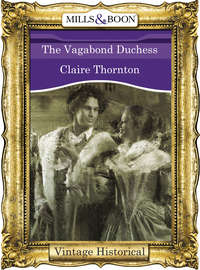
Полная версия
The Defiant Mistress
‘You’re lying,’ he said through clenched jaw. ‘Frances didn’t send that message. Where is she? What have you done to her?’
‘I haven’t done anything to her,’ the stranger replied. ‘My purse isn’t deep enough for the likes of her. But she’s found herself a nice rich protector now. He’s wealthy beyond her dreams—’ The man gasped as Gabriel’s grip on his throat tightened. He retaliated by pressing his knife harder against Gabriel’s stomach. ‘Not so tight, coxcomb. Your guts’ll make a nasty mess o’ those fine clothes of yours.’
Gabriel relaxed his grasp and shifted his weight as if he intended to step away. The stranger reduced the pressure on the blade. The next second Gabriel seized his wrist and spun him around in a shoulder-wrenching hold. He forced the man’s arm up behind his back and thrust him against the wall, grinding his face against the plaster.
‘Where’s Frances?’ he demanded harshly.
‘I’ll show you,’ the man choked. ‘No need to break my arm. I’ll show you.’
‘What is this place?’ Gabriel balked, looking around in displeasure.
From the outside he’d assumed he’d been led to an alehouse. From the inside it was clear that the building was both more sumptuous and a lot less respectable than he’d anticipated. He heard laughter and raucous voices behind one half-open door. Another door crashed open and a woman emerged, her head turned as she giggled teasingly at the occupant of the room. She was barely wearing her shift. The garment had slid down both shoulders, only her hands clutched to her breasts prevented it from falling off completely.
‘Frances isn’t here.’ Gabriel turned to leave. ‘You’ve brought me on a fool’s errand.’
His guide blocked his way, grinning with disagreeable self-assurance. Gabriel felt a stab of fear, not for himself, but for Frances. He’d been unwise to follow a stranger into an unfamiliar part of the City, but he was confident of his ability to extricate himself from trouble. Frances had grown up in the country. By her own account she had come to London less than a year ago to live with her aunt after the death of her father. She was still unversed in the many hazards of the sinful capital.
‘What have you done to her?’ Fear roughened his voice.
He made an involuntary movement towards the man and saw, just in time, the dull glint of the knife.
‘Upstairs, lordling.’
Gabriel’s heart thumped with apprehension as he mounted the narrow stairs.
‘In here.’ A thump between his shoulder blades directed him into a small chamber. ‘Now look here,’ said his guide in a low voice. ‘And keep quiet if you want to know the truth about your virtuous Frances.’
A spyhole!
Gabriel bit back a curse. What kind of fool was he being played for? He took a step backwards and felt a dagger against his side. He’d half-turned towards the man, intending to deal with his impertinence once and for all, when he heard a muffled voice he thought he recognised.
Shocked and disbelieving, he put his eye to the spyhole. Frances? Dear God, it was Frances!
Gabriel pressed his hand flat against the wall as he watched her accept a wine posset from a man he’d never seen before. Frances drank and handed the vessel back to her companion. The man made a show of turning the cup so he could drink from the very place her lips had touched. He spoke, complimenting her on her beauty and Frances smiled at him!
Gabriel’s hand closed into a fist, his knuckles pressing into the plaster as he saw Frances lift her face to be kissed. The man’s lips touched her cheek and then her mouth. Frances laid her hands on his shoulders, inviting his liberties.
A few moments later the man turned Frances and began to unlace her bodice. She allowed him to remove it and made no protest when he fumbled at the neckline of her chemise. The man exposed her breast and bent his head to lay his mouth against the soft flesh.
Gabriel broke free from his horrified paralysis. He reared up and around, nearly blind with outrage and the pain of betrayed love. So intent was he on confronting his traitorous bride and her lover that he’d forgotten his companion.
The man hit Gabriel neatly on the back of the head with the hilt of his dagger.
Gabriel’s awareness clouded. He struggled to remain conscious, but his knees sagged and he slid painfully into darkness. The last thing he heard was a woman’s mocking laughter.
Athena sat on a straight-backed chair in the dark, waiting with sick dread for Samuel to come to bed. Her cold fingers twisted and curled ceaselessly around each other as she thought of all that Samuel had done to her in the two weeks since their wedding day. Soon he would join her again. Waves of revulsion surged through her. She twisted her fingers against each other until her hands hurt.
When she had fled from Samuel ten months earlier, it had never occurred to her that her flight would eventually end with her back in Kent and married to him. But at least Gabriel and Aunt Kitty were safe. To Athena’s huge relief, Aunt Kitty had been restored unharmed to her home a couple of days after the wedding. Athena didn’t place much faith in Samuel’s integrity, but he had kept his promise where Aunt Kitty was concerned. She had to believe that he would also keep his word not to inform on Gabriel.
Samuel veered wildly in the things he said about Gabriel. Sometimes he claimed Athena had only allowed Gabriel to court her to provoke his— Samuel’s—jealousy. At other times he said things that indicated he did know that Athena really loved Gabriel. On those occasions it was easy to believe that Samuel had married her primarily to punish her for rejecting him, rather than because he wanted her.
Athena found a certain, terrible, comfort in her conviction that Samuel had married her to punish her. It meant that Gabriel was relatively safe from arrest. After all, if Gabriel was seized and executed, Samuel would no longer have any power over her. Athena had repeated that simple fact to herself over and over again during the past fourteen days. She was keeping Gabriel safe. It was the only thing that had enabled her to endure her new life. Her head jerked up, her breath catching in her throat, as she heard footsteps outside the door. She squeezed her fingers cruelly together in anticipation of Samuel’s entrance, then realised what she was doing and forced herself to fold her hands quietly in a semblance of serenity. She would not give Samuel the satisfaction of knowing how much she feared him.
The room was suddenly illuminated by the flickering light of a single candle. Samuel walked across the room to stand over her.
‘Sitting in the dark? I’ve married an economical wench,’ he said sarcastically.
‘The light strains my eyes,’ she replied in a low voice.
‘You were thinking about your lover!’ he accused her. ‘Dreaming that he might come and claim you!’
‘No.’ Late at night, when Samuel slept, Athena yearned for such a miraculous rescue. But she’d already discovered how angry Samuel became when he thought of her with Gabriel. His charade that she’d only trifled with Gabriel to incite his jealousy had worn very thin.
‘You’re lying, you whore. You look so sweet and innocent, but beneath that beautiful face you have the heart of a harlot.’
Athena gazed slightly to one side of his face, trying to let his tirade wash over her. She was starting to learn how to survive his verbal abuse. Let him rant and rage and do as he pleased. Eventually he would go away, lose interest, or simply fall asleep. She could survive.
He hated it when she didn’t respond to him. What he had always craved most from the moment he’d first laid eyes on her was her attention—her smiles and favour for preference, but at the very least her attention.
‘He’s gone to Turkey!’ he jeered.
‘What?’ Athena’s eyes jerked to Samuel’s face.
‘Your faithless former bridegroom. He never turned up for the wedding, you know. I had him watched. If you’d failed to keep our little bargain, I would have had him arrested. But he doesn’t even know you jilted him because he never went to the church! He never meant to marry you!’
‘I don’t believe you!’ Athena could not—would not—believe Samuel’s cruel claim. Gabriel loved her. She knew he did.
Samuel laughed. ‘Did you really think you meant more to him than a pleasant interlude? He sailed in one of Parfitt’s ships for Turkey two days ago.’
‘Turkey?’ Athena whispered. She knew that Sir Thomas Parfitt’s trading interests extended to the Turkish empire and perhaps beyond. Gabriel had often talked about how much he’d enjoyed his years in Italy. Could it be true…?
‘You said he was plotting against Cromwell.’ She tried to make sense of how the letter incriminating Gabriel in the plot against the parliamentarian leader fitted with the news that he had sailed for Turkey.
‘Fickle noblemen. They treat everything as a game.’ Samuel dismissed Athena’s comment with a disdainful gesture. ‘You’re lucky I found you in time. Otherwise you’d have been left standing alone at the church. The whole world would have known you for a foolish maid, easily duped by a faithless cavalier. Come to bed, wife.’
Athena did not protest. Since their wedding day Samuel had required no more from her in bed than her passive acceptance of him, and it was over quicker that way.
Later she lay on her side, listening to him snore behind her, silent tears running down her cheeks. Until tonight she had still preserved a glimmer of hope that Gabriel might be looking for her. That somehow there was a way out of the nightmare her life had become. Of course such hopes were not logical. If Gabriel found her, it would put him at risk and her sacrifice on his behalf might end up being for nothing. But still she’d hoped for a miracle: that her love for Gabriel and his for her would triumph over Samuel’s obsessive desire to possess her.
But Gabriel had gone to Turkey. Despite her longing to believe otherwise, she was already half-certain Samuel’s story was true. She knew Sir Thomas Parfitt traded there. Gabriel was adventurous and ambitious. He would surely see this new venture as an exciting opportunity to improve his fortune. Besides, it had been Gabriel’s presence in England, his vulnerability to arrest by Cromwell’s agents, that had given Samuel his hold over her. Why would Samuel tell her Gabriel had left, and thus willingly relinquish his power over her if it wasn’t true?
Athena swallowed an anguished sob. All her efforts to protect Gabriel had been meaningless. By now he must be beyond Cromwell’s retribution. And he hadn’t even gone to the church to marry her. She had pictured him so many times waiting for her, worrying about her, trying to find her—and now it seemed he didn’t even know or care that she hadn’t turned up.
Her throat burned with stifled grief. It had all been for nothing. And now she no longer had the thought of Gabriel’s safety to sustain her in her nightmarish marriage. She had nothing at all. She opened her eyes and stared into the darkness at the bleak future ahead of her. Soon Samuel would destroy her spirit. She could already feel her self-confidence seeping away day by day. Soon she would be so browbeaten she would no longer have the will to resist.
She could not let that happen. Slowly her despair hardened into cold determination. Gabriel had left England. It made no difference to his safety whether she stayed with Samuel or not. She had run away before, she could do it again. And this time she would make sure Samuel never found her.
But…but…
A small doubt slipped into her mind. What if Gabriel came back to England after she’d left? Would Samuel inform on him just for spite? She bit her lip—no matter how inconstant Gabriel had proved, she couldn’t bear the thought he might hang. Before she left she would find and destroy the fragment of letter Samuel had shown her that proved Gabriel’s complicity in the plot against Cromwell. Then she would disappear.
And she would never again be any man’s dupe.
Chapter One
English Convent, Bruges, April 1666
‘W hat do you mean—she’s not here?’ the Duke of Kilverdale’s voice rose in angry disbelief.
‘Exactly what I said, your Grace,’ the Abbess replied. ‘I am afraid your cousin is no longer here at the convent.’
The Duke’s black eyebrows snapped together. ‘For the past seven years my mother has made generous contributions to your order,’ he said. ‘With the clear understanding that Athena would be free to live here peacefully under your protection. Why did you send her away?’
‘I did not send her away,’ the Abbess replied. ‘She chose to leave on an errand of mercy.’
‘To go where?’
‘Venice—’
‘What!’ Kilverdale leapt to his feet. At six feet tall he towered over the seated Abbess. He was dressed in the height of fashion in silk brocade and a magnificent black periwig, but his costly garments could not disguise the underlying power in his lean body. Nor could the profusion of black curls, which framed his face and tumbled about his shoulders, soften the somewhat predatory appearance of his hawkish features. The Abbess considered him a dangerous man and a far from suitable visitor to her convent, but in the circumstances she could hardly refuse to speak with him.
The Duke’s mother and Athena’s mother were sisters. Seven years ago the widowed Duchess of Kilverdale and her son had been living in exile in France. When Athena ran away from Samuel, she had made the perilous journey to France to beg for her aunt’s protection. In early 1659 the Duchess had brought her niece to Bruges, to live as a guest within the English convent. A year later Charles II regained his throne. The Kilverdales had returned to England, but the Duchess had continued to give generous donations to the convent and the Duke had come to Bruges at irregular intervals to meet with his cousin.
‘Kindly allow me to finish,’ the Abbess said, before Kilverdale could say any more. She disliked his obvious intention to intimidate her in her own quarters. ‘Mrs Quenell left here of her own free will as, indeed, she first arrived here.’
Kilverdale raised a sardonic eyebrow, clearly unimpressed.
The Abbess strove for patience and continued. ‘Several weeks ago the wife of one of the undersecretaries to the English Ambassador in Venice arrived in Bruges. The young woman was brought to us in great distress. We discovered she was urgently seeking to join her husband in Venice—apparently she had not been kindly treated by her husband’s kinfolk in his absence. Mrs Quenell was much moved by her plight and offered to accompany her to Venice as her companion and guide—’
‘Guide?’ Kilverdale exploded. ‘You allowed my cousin, who has not been outside the security of these walls for seven years, to go gallivanting across Europe with only a foolish wench for company—and you say she’s a guide! Where were your wits, madam?’
‘They are accompanied by the manservant the young woman brought with her from England and Mrs Quenell’s own maid. In addition, they are being escorted by a local gentleman of good family who is on his way to study at the university of Padua,’ the Abbess snapped, out of all patience with her noble visitor.
The Duke’s muttered response was barely audible, but supremely uncomplimentary.
‘Your cousin is a woman of great resource and common sense and I have every confidence she will reach her destination unharmed and without difficulty,’ the Abbess retorted. ‘Don’t forget she managed to make her way safely all the way from England to find your mother in France when she was only seventeen.’
‘She cut off her hair, dyed it brown, and pretended to be a boy!’
‘A sensible precaution for a woman travelling alone. She came to no harm. She has often entertained me with the story of her journey.’
‘Entertaining!’ Kilverdale snorted scathingly. ‘Yes, and it is very entertaining for me to come to Flanders to tell her that her husband is dead and it’s now possible for me to escort her back to England—only to find she isn’t here!’
‘She knows her husband is dead. She received a letter from your mother just before she left for Venice.’
‘She knows? Well, why the devil didn’t she wait for me to come and fetch her back?’
‘It is weeks since she heard the news,’ the Abbess said drily.
Kilverdale scowled. ‘I was preoccupied with other business,’ he said. ‘I’m here now.’
‘So you are.’ The Abbess watched as he took a couple of glowering circuits around the room.
He stopped and drew in a deep, annoyed breath. ‘I’ll just have to follow her to Venice and fetch her back from there,’ he announced. ‘Damned troublesome females!’
He strode over to the door and left without a backward glance. The Abbess allowed herself to relax a little. The mercurial Duke could be a most unsettling visitor. Less than thirty seconds later she heard his decisive footsteps once more approaching her room.
He stepped over the threshold and looked straight at the Abbess. For a few moments his penetrating gaze focused entirely upon her with disconcerting intensity.
‘It seems this is the last time we shall meet, madam,’ he said. ‘I thank you for offering your protection and hospitality to my cousin these past seven years.’
He swept her a deep bow, his every movement filled with proud masculine grace. Then he turned once more on his heel and departed without waiting for her to respond.
Venice, May 1666
‘Our bargain is complete, illustrissimo.’ Filippo Correr sat back and smiled with satisfaction. ‘The glass will look beautiful in your new house.’
Gabriel smiled at Correr, just as pleased as the Venetian merchant with the outcome of their bargaining. The two men had first met twelve years ago when they were apprentices in Livorno. They’d both worked hard to learn their respective trades, but they’d enjoyed themselves as well. Gabriel had many happy memories of his youthful exploits in Filippo’s company—but neither man had allowed sentiment to interfere with their afternoon of hard bargaining over Gabriel’s purchase of Murano glass.
‘I am sure it will,’ he said. ‘When you next visit London you must be my guest so that you can see it in place.’
‘I will be honoured,’ said Correr. ‘Is the house finished?’
‘The construction work should be completed by the time I return home,’ said Gabriel, stretching out his legs. Now that the business part of the meeting had been concluded, he relaxed as he discussed his newest project with his old friend. ‘The interior will still need furnishing and decorating. I have some ideas in mind, but I decided not to make any final decisions until I could walk through the rooms.’
‘Ah.’ Correr nodded, and then gave a sly smile. ‘You need a wife,’ he said. ‘Women enjoy that kind of thing.’
Gabriel laughed. ‘I don’t think so,’ he replied easily. ‘If I need assistance—which, after fifteen years in the silk trade, I don’t believe I do— I’ll consult an expert.’
‘But your “expert” won’t give you sons,’ Correr gestured expansively. ‘Children are a joy—’
‘Your children are,’ said Gabriel. ‘Not all men are so blessed.’
‘If you raise them right…they are like little seedlings,’ said Correr. ‘They lift their heads to the sun and grow straight and strong.’
Gabriel grinned. Filippo’s children were the only chink in the hard-headed merchant’s armour.
‘You think I am foolish and sentimental,’ said Correr cheerfully. ‘Just wait, my friend. The first time you hold your son in your arms you will feel exactly the same.’
‘Perhaps,’ said Gabriel, cautiously conceding the point. To his knowledge, he had no children, but he was certainly fond of his various nieces and nephews.
‘But first you need a wife,’ said Correr. ‘I know a sweet and modest maid—’
Gabriel threw up a hand. ‘I don’t need you to act as my marriage broker,’ he said. ‘And I’ve no wish to marry a Venetian.’
‘This lady is Florentine,’ said Correr, unperturbed by Gabriel’s objection. ‘The gracious sister-in-law of my cousin Marco Grimani. Very quiet. Very gentle and modest. Most skilled at housekeeping.’
‘No dowry?’ Gabriel raised an eyebrow as he noted his friend’s emphasis on the lady’s personal qualities.
Correr shrugged. ‘You do not need a wealthy woman,’ he pointed out. ‘You need a wife to make you a comfortable home and give you heirs. Giulietta Orio could do that.’
‘I certainly need heirs,’ said Gabriel, ‘but, with all due respect to the gracious sister-in-law of your cousin Marco, I’ll marry an Englishwoman.’
‘I tried,’ said Correr philosophically. ‘I will tell Marco I tried. Giulietta Orio is a charming lady but, on reflection, she might be a little too timid to begin a new life in London. We will have to look elsewhere for her husband.’ He glanced out of the window.
Gabriel followed the direction of Correr’s gaze. He saw that twilight was falling on the city, cloaking the canals and buildings in mystery.
‘It’s getting late,’ said Correr. ‘Let’s go and find my wife and the children. Will you eat with us?’
‘It will be my pleasure,’ Gabriel replied, and meant it. Gabriel had always appreciated Filippo’s friendship, even though he was less appreciative of the Venetian’s matchmaking tendencies. Gabriel knew he needed a wife, especially in view of the unexpected course his life had taken. He’d been very busy since the death of his brother, but when he returned to England this time he would seek out a suitable bride. A modest, well-bred lady who would understand the duties expected of his wife. He certainly wouldn’t repeat his youthful mistake of thinking himself in love with the woman. He would treat the marriage contract as he would any other business contract, and make sure his prospective wife understood the terms of their union.
‘Oh God, I hope he’s pleased to see me!’ Rachel Beresford muttered. She stared straight ahead, showing no interest in the extraordinary city that rose around her from the waters of the lagoon.
‘Of course he will be,’ Athena said reassuringly. She took one of Rachel’s cold hands between both of hers. ‘He may be a little surprised at first, but I’m sure he will be pleased to have you with him,’ she said.
‘I don’t know how I would have managed without you,’ Rachel said jerkily. ‘I am so grateful… Oh God! I’m so nervous!’ She pressed her free hand to her mouth.
‘It won’t be long now. Soon you’ll be safely together again.’ Athena devoutly hoped Edward Beresford would be pleased to see his young wife. If he wasn’t, she might find herself in the middle of a very difficult situation, but she didn’t regret her decision to travel with Rachel.
As soon as she’d heard the young woman’s story, Athena’s compassion had been stirred. She remembered all too clearly what it was like to be alone, far from home, and unsure of receiving a warm welcome. She’d offered to accompany Rachel for the rest of the journey because she understood and sympathised with Rachel’s obvious anxiety. But Athena was honest enough to admit to herself that she’d been growing restless within the confines of the convent—especially after she’d received the news of Samuel’s death. Rachel’s need for support had given her a legitimate excuse to leave. Unlike her companion, Athena had enjoyed their trip across Europe.
They had arrived in Venice just as twilight was falling. Despite her concerns on Rachel’s behalf, Athena was enthralled by her first glimpse of the city. She turned her head left and right in an effort not to miss anything as the gondola slid through the waters of the grand canal. She was almost sorry when they came to rest at the watergate of the Ambassador’s palazzo.
Rachel didn’t share her companion’s curiosity about their surroundings. Her hands felt icy cold as Athena helped her climb out of the gondola. It was clear she was thinking only of her imminent reunion with her husband.
A member of the Ambassador’s staff appeared before them on the steps. Pieter Breydel, the gentleman who had escorted them from Bruges, spoke to the servant, explaining who Rachel was and that she had come to join her husband. Athena checked that the rest of her little party was complete, and that their luggage was being attended to. Then she took Rachel’s hand. They followed Pieter Breydel and the embassy servant into the palazzo. Her maid and Rachel’s manservant trailed behind them.






